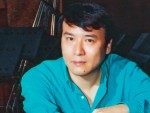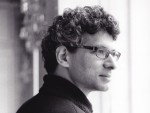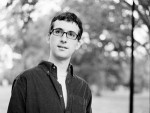Title
The planning process for new music concerts can lead to some unexpected adventures. The New Juilliard Ensemble’s concert on Friday, November 12, in Alice Tully Hall, with a nice mixture of music from Italy, China, and the United States, presented an interesting variety of challenges, all with happy endings (thankfully). The program will include two world premieres, two Western Hemisphere premieres, and a second New York performance.
Body
The principal adventures concerned pieces by the Chinese composer Xiaogang Ye and Italian composer Luca Lombardi. The story of Ye’s piece began in the spring of 2008. When he visited me in New York, I told him that N.J.E. would be giving a concert of Chinese music in November 2009, and that I wanted very much to include something by him. Unfortunately, I added, his only piece with appropriate instrumentation was written quite some time ago. He promptly offered to write a piece. Who would turn down such an offer? As the deadline approached, however, I heard nothing. Finally I was told that the music would arrive three weeks before the concert, which was clearly not feasible. I therefore programmed the earlier piece, which was a great success. The following May, when I participated in the Beijing Modern Music Festival, a Swiss group presented a new piece by Ye called Yangzhuoyong Cuo, after a famous Tibetan lake. In fact, it was the piece he was writing for N.J.E., but now it was dedicated to the Swiss! Such is life. N.J.E. will give its American premiere on November 12.
Luca Lombardi’s Lucrezio, Part II, for soprano, baritone, narrator, and chamber orchestra, presented another challenge. Having known Lombardi and his music for many years, I was delighted to find a recent piece well suited to N.J.E. Although I have found that vocal pieces can rarely be performed in translation without damaging the unity of text and music, I felt from the beginning that it would be a mistake to have the narration in Italian, since the audience would end up staring at the translation and not absorb the music. It also seemed quite practical, since much of the narration is rhythmically free, and I felt that an English version could be reconciled with the rhythmic notation that the composer uses at various points. The text comes from the Roman author Lucretius’s writings on the material world, which has been translated more than once. I did not count on Lombardi’s attachment to the particular text, which had been translated by the late poet Edoardo Sanguineti expressly for Lombardi. Understandably partial to Sanguineti’s version, he would not consider an English version. We went around in circles; his publisher’s representative at first agreed with the composer, but when I suggested he consider whetherL’histoire du soldat is performed in French at concerts in the United States, Germany, Russia, etc., he saw the point, responding that he had never heard Grieg’s Peer Gynt done in Norwegian.
I felt so strongly about it that I said I had to reconsider whether we should perform the piece. Then it turned out that Lombardi, who was traveling, did not have a copy of it and did not remember the piece too clearly. When his publisher sent him a copy by e-mail, he decided that it could be done as long as the translation preserved Sanguineti’s poem. The process took more than a month, and was coming dangerously close to the last moment. I won’t feel completely at ease until I get the English version, which is being prepared in Italy, but at least the performance will take place.
The saga did not end there, however. Every Juilliard soprano and baritone capable of singing the piece is going to be immersed in rehearsals for this month’s Juilliard Opera performances of Monteverdi’s L’Incoronazione di Poppea. Vocal Arts informed me that I’d have to go outside our walls. The singers will be soprano Mary Mackenzie and baritone Jeffrey Gavett, extremely experienced performers of new music. For the narrator I wanted a drama student, but the part requires highly acute musical skills. Fortunately, I found a good match in Alex Hanna, a third-year drama student who is such an accomplished singer that he gave a solo recital at Juilliard last year.
Another performance challenge was raised by Keeril Makan’s Dream Lightly, for electric guitar and ensemble. I met Makan, a member of M.I.T.’s music faculty, after a concert that I conducted at Harvard last year. In response to my suggestion, he sent me several pieces, and Dream Lightly both captured my attention and was appropriately scored—if we had a student who also played electric guitar and was drawn to traditional repertory. Juilliard’s guitar department, in my experience, has been very traditional, but times change, and Sharon Isbin, our guitar master, directed me to two students with a strong interest in new music who also play electric. Colin Davin was available and excited to do it. He warned that he does not have his ancillary equipment in New York, but Makan’s piece makes no special demands—other than a part entirely in harmonics!
Edward (Ted) Goldman (Photo by Timothy Stansell)The other compositions scheduled for November 12 are by composition students who were selected in N.J.E.’s annual audition process. Neither piece caused me any special problems; both were submitted on time and were beautifully copied. Niccolo (Nicco) Athens received his B.M. degree in May as a student of Samuel Adler and has gone on to the doctoral program at Cornell University, studying with Roberto Sierra and Steven Stucky. His Divergent Paths, composed during a summer spent in China, blends Chinese and Western styles. It thus makes an interesting pairing with Xiaogang Ye’s piece, which also crosses cultures.
Edward (Ted) Goldman is in his third year of the C.V. Starr Doctoral Program. His piece bears the cryptic titleEnzheii, and although he has opted not to explain it, it may be deciphered using the relatively standard pronunciation of the Chinese sound rendered as “zh,” which is more or less like the initial consonant of “gentleman.” He writes, “Enzheii was written in a rocking chair that sat in a room full of windows overlooking a lake. Though the music is entirely abstract, its structures and processes can be described through analogies both to the lake and the surrounding woods. ... While Enzheii is not a pastoral piece, its roots can be found in the natural world visible from the rocking chair in which it was written.”







